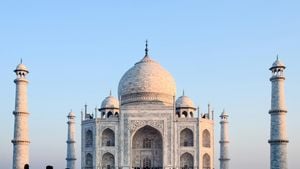During his recent visit to the G20 Summit held in New Delhi, Indian Prime Minister Narendra Modi made headlines not only for his leadership but also for the thoughtful gifts he presented to other world leaders. These gifts, rich with cultural significance, highlight India's heritage and craftsmanship, leaving many to ponder the stories behind these carefully chosen items.
Modi's approach to gifting has become a point of interest, especially as he selected items to reflect India's diverse cultural legacy. For example, he gifted traditional silver and gold artifacts crafted by skilled artisans from various regions of India, showcasing the nation's age-old artistry. Each item serves as a narrative of India's history, connecting leaders from around the world through the common thread of cultural appreciation.
One notable example was the handcrafted wooden chess set, intricately carved to represent India's history of chess, also known as Chaturanga, which originated right there on the subcontinent. This gift not only serves as a token of goodwill but also fosters conversation about the game’s historical significance and intellectual depth.
While Modi's gifting choices have garnered praise, they are also seen within the longer tradition of using gifts as diplomatic tools. Historically, gifts can build bridges, support alliances, and create lasting impressions. Modi’s selections reflect this notion—it’s as much about diplomacy as it is about showcasing Indian craftsmanship.
For many attendees, the gifts were more than just material items; they were symbolic gestures intended to strengthen international ties. The gestures signal India's position as both a rising power and as the custodian of rich historical traditions being carried forward.
Another highlight of Modi’s gifting was the exquisite flow of tea from the renowned Darjeeling region, which accompanied some of the artifacts. Known as the 'Champagne of Teas,' Darjeeling tea is celebrated globally for its unique flavor profile. Presenting this alongside handcrafted pottery cups exemplified the fusion of culture and hospitality, inviting world leaders to experience the essence of Indian hospitality.
The gifts also parade through different regional styles, symbolizing the unity within the diversity of India itself. For example, items from Kerala's traditional handicrafts showcased the state's rich history with coir products and coconut shell artistry, offering leaders insights not only about regional specialties but also about the lives of the artisans.
Critics, of course, have speculated about the financial aspect of such gifting strategies—some question whether the expenditures allocate resources away from pressing domestic needs. Yet, proponents argue these diplomatic gestures can lay the foundation for economic partnerships and cultural exchange programs, which might, in return, benefit the Indian economy.
Many relief organizations and cultural bodies have worked hand-in-hand to develop sustainable practices for the artisans, encouraging the continuity of such traditional crafts. This means every gift handed over at the summit helps sustain the artisans, keeping alive the skills of generations.
Public response to Modi's choices has amplified discussions on the importance of heritage and cultural representation even on global platforms. Social media erupted with comments praising the uniqueness of the gifts, framing this as not just extravagant goodwill but as advertisement of India’s rich cultural narrative.
The gifting practice at international summits also serves as reflections of what countries want to convey about themselves. Modi's choices aimed to brand India as not just economically viable but as rich with tradition, history, and community. Is there any greater advertisement of national pride than sharing the very best of what it has to offer?
Looking to the future, Modi’s gifts have set the tone for what might be expected as India's soft power continues to grow on the world stage. By intertwining cultural artifacts with diplomatic efforts, India’s strategy moves beyond mere political maneuvering— it's about creating partnerships rooted firmly within mutual respect and admiration for one another's heritages.
For Modi, the act of gifting symbolizes more than just the exchange of material goods. It is about creating memories, fostering goodwill, and crafting narratives interwoven with threads of culture and tradition. Every leader who received one of his gifts left with not just the item itself but with the story and significance behind it—a story connected back to the rich history and vibrant cultures of India.
From traditional artifacts to culinary delights, the gifts shared at the G20 Summit serve as reminders of the powerful narratives rooted in collective heritage, paving the way for future engagements, conversations, and collaborations. India's approach through these gifts signals its aspirations to shape global conversations by sharing its stories, one carefully chosen artifact at a time.



